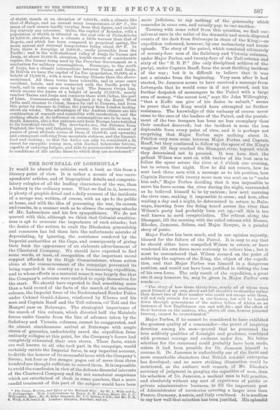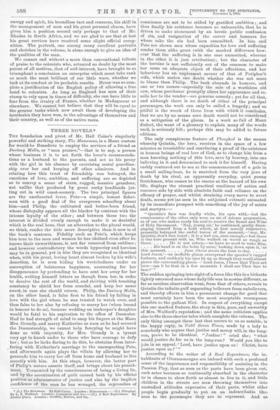THE DOWNFALL OF LOBENGITLA.* IT would be absurd to criticise
such a book as this from a literary point of view. It is rather a mosaic of war corre- spondents' articles, and of biographical details and congratu- latory eulogies of all the leading characters of the war, than a history in the ordinary sense. What we find in it, however, is plenty of graphic detail and a daily account of the incidents of a savage war, written, of course, with an eye to the public at home, and with the idea of presenting the war, its causes, and results, in a manner such as to silence the carping attacks of Mr. Labouchere and his few sympathisers. We do not quarrel with this, although we think that Colonial sensitive- ness is apt to overrate the importance of such attacks; but the desire of the writers to exalt the Rhodesian generalship and resources has led them into the unfortunate mistake of depreciating, by ignoring, the assistance rendered by the Imperial authorities at the Cape, and consequently of giving their book the appearance of an elaborate advertisement of the Chartered Company. We should have expected to find some words, at least, of recognition of the important moral support afforded by the High Commissioner, whose action alone at the commencement of the campaign prevented its being regarded in this country as a buccaneering expedition, and to whose efforts in a material sense it was largely due that the Company's columns were enabled to equip themselves for the start. We should have expected to find something more than a bald record of the facts of the march of the southern column, the Imperial force of the Bechuanaland Border Police under Colonel Goold-Adams, reinforced by Khama and his men and Captain Raaff and the Tuli column, via Tati and the liangwi pass on Bulawayo. The strategical importance of the march of this column, which diverted half the Matabele forces under Ga,mbo from the lino of advance taken by the Salisbury and Victoria columns, cannot be exaggerated, and its almost simultaneous arrival at Bulawayo with ample stores of groceries, undoubtedly saved the expedition from untimely collapse at this point, for the Company's forces had completely exhausted their own stores. These facts, which are well known to all 'who took part in the campaign, would certainly entitle the Imperial force, in any impartial account, to divide the honour of its successful issue with the Company's forces; but four or five meagre pages out of more than three hundred are thought sufficient to record them. It is impossible to avoid the conclusion in view of the delicate financial interests of the Chartered Company and the not unnatural suspicions which are entertained of them in some quarters, that a more candid treatment of this part of the subject would have been * The Cause, History, awl Effect of the Matabeit War, By W. A., Wills and L. T. Ooningridae. 'With Contributions by Major 1'. W. Forbes, Major Sir J. 0. Willoughby-, Bart, Mr. }I. Rider Haggard, Mr. P. 0. Belong, P.Z.8., and Mr. P. R. Wroy, AM.Inst.O.E. Londoni bimpkin, marehall, mid Co.
more judicious, to say nothing of the generosity which comrades in arms owe, and usually pay, to one another.
Turning with some relief from this question, we find our- selves at once in the midst of the dramatic and much-disputed events of the dash from Buluwayo in chase of the King,—an expedition redeemed, however, by one melancholy and heroic episode. The story of the patrol, which consisted ultimately of seventy-four men of the Salisbury and Victoria columns, under Major Forbes, and twenty-four of the Tali column and sixty of the "B. B. P." (the only disciplined soldiers of the party), under Captain Raaff, form the most thrilling incident of the war ; but it is difficult to believe that it was not a mistake from the beginning. Very soon after it had started, Dr. Jameson seems to have received a message from Lobengula that he would come in if not pursued, and his farther despatch of messengers to the Patrol with a large sum of money, "the surest test," says Sir John Willoughby, "that a Kaffir can give of his desire to submit," seems to prove that the King would have attempted no further resistance. The knowledge of this embassy of course never came to the ears of the leaders of the Patrol, and the punish- ment of the two troopers has been no less exemplary than their conduct deserved; but the incident is none the less deplorable from every point of view, and it is perhaps not surprising that Major Forbes says nothing about it. Friction very soon arose between Major Forbes and Captain Raaff, but they continued to follow up the spoor of the King's waggons till they reached the Shangani river, beyond which they determined not to proceed. It was here that the gallant Wilson was sent on with twelve of his best men to follow the spoor across the river at 5 o'clock one evening, but to return that night. How he did not return, how he sent back three men with a message as to his position, how Captain Borrow with twenty more men was sent on to "make him safe," Major Forbes deciding that it was impossible to move his force across the river during the night, surrounded as he believed himself to be by natives ; how next morning the river rose, making it impossible to cross; and how, after waiting a day and a night, he determined to return to Bula- wayo, knowing from the firing heard across the river that Wilson's party had probably been cut up,—all this is too well known to need recapitulation. The retreat along the Shangani, till the meeting with the relief column with Messrs. Rhodes, Jameson, Selma, and Major Sawyer, is a painful story of panic.
Major Forbes has been much, and in our opinion unjustly, blamed for the failure of the Patrol. It is easy to say that he should either have compelled Wilson to return, or have weakened his own force more seriously to relieve him ; but it must be remembered that Wilson seemed on the point of achieving the capture of the King, the object of the expedi- tion, and that Major Forbes was himself in a dangerous position, and would not have been justified in risking the loss of his own force. The only result of the expedition, a great one it may however be, may be given in Major Forbes' own words :— "The story of how these thirty-four, nearly all of whom were great friends of my own, stood and fell shoulder to shoulder rather than desert, two of their number who could not escape with them, will not only remain for ever in our history, but will be handed down through generations of the native tribes of Africa as an instance of how Englishmen can and will die ; and the effect of their heroism on the natives, who, above all else, honour personal bravery, cannot be overestimated."
Major Forbes, if he cannot be considered to have exhibited the greatest quality of a commander—the power of inspiring devotion among his men—proved that he possessed the true soldierly qualities of foresight and prudence, combined with personal courage and coolness under fire. No better selection for the command could probably have been made, unless it had been possible for Dr. Jameson himself to assume it. Dr. Jameson is undoubtedly one of the finest and most remarkable characters that British colonial enterprise has developed ; and no more striking illustration could be mentioned, as the authors well remark, of Mr. Rhodes's accuracy of judgment in ganging the capacities of men, than his selection of Dr. Jameson, a medical man in full practice, and absolutely without any sort of experience of public or private administrative business, to fill the important post of Administrator of territories covering a larger area than France, Germany, Austria, and Italy combined. It is needless to say how well that seleotion has been justified. His splendid energy and spirit, his boundless tact and. resource, his skill in the management of men and his great personal charm, have given him a position second only perhaps to that of Mr. Rhodes in South Africa, and we are glad to see that at last his great services have received some slight official recog- nition. The portrait, one among many excellent portraits and sketches in the volume, is alone enough to give an idea of the qualities of the man.
We cannot end without a more than conventional tribute of praise to the colonists who, actuated no doubt by the most potent of all motives, that of self-interest, have brought to so triumphant a conclusion an enterprise which must take rank as much the most brilliant of our little wars, whether we look at its conduct or its probable results. Never was so com- plete a justification of the English policy of allowing a free hand to colonists. As long as England has men of their stamp to rely upon in times of difficulty, she can have little to fear from the rivalry of France, whether in Madagascar or elsewhere. We cannot but believe that they will be equal to the greater tasks which now await them of developing the territories they have won, to the advantage of themselves and their country, as well as of the native races.



















































 Previous page
Previous page